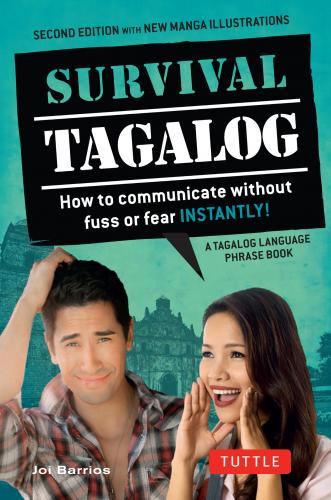Survival
TAGALOG
How to communicate without
fuss or fear INSTANTLY!
SECOND EDITION
by JOI BARRIOS
TUTTLE Publishing
Tokyo | Rutland, Vermont | Singapore
CONTENTS
Tagalog, Pilipino, or Filipino?
The Tagalog People, the Language and Philippine History
Vocabulary
Language Policy
Orthography
A, B, C ... the Tagalog and Filipino Alphabets
See It, Say It: Pronunciation Guidelines & Tips
Get Sentenced! Grammar
PART 1
Common Expressions and Key Words
Hi! Goodbye! Greetings
Chatting
I’m Melissa. You’re Sam. Who’s He? Personal Things
The Ties that Bind … Family
A Little Respect, Please: Personal Titles
Academic Titles
Business and Professional Titles
Who, What, Why... Asking for Anything
PART 2
1, 2, 3: The Cardinal Numbers in Tagalog/Filipino
Counting People, Objects and Buildings
Counting Paper & Liquid
1st, 2nd, 3rd: The Ordinal Numbers
Telling Time
Yesterday, Today, Tomorrow
Days of the Week
This Week, Next Week
The Months
The Year
PART 3
Travel Vocabulary and Useful Expressions
Airport/Airlines
Money
Taxis/FX or GT Express Service
Directions
Metro Manila Trains
Buses and Jeepneys
Tricycles
Rental Cars
Philippine National Railways Routes
Hotels and Resorts
Toilets/Restrooms
Seasons and Weather
Tropical Storms
Eating
Drinks
Bills/Receipts
Telephone/Cell Phone
Buying a Cellphone
Internet/Computer
Using Wi-Fi Connections
Shopping
Shopping for Clothes
Business
Post Office/Courier Companies
Health/Emergencies
Barbershop
Beauty Salon
Measurements
Visiting Someone at Home
Holidays
Sightseeing
Popular Destinations in Metro Manila
Popular Destinations Outside of Metro Manila
PART 4
Geography Guide & Reading Signs
The Administrative Regions
Major Cities
Other Key Words
Reading Common Signs
PART 5
TAGALOG, PILIPINO, OR FILIPINO?
Is the Tagalog language different from the Filipino language? What is Pilipino? What language is being taught in this book?
The Tagalog People, the Language and Philippine History
The word Tagalog refers to an ethnolinguistic group—the Tagalog, as well as their language. It is derived from the word taga-ilog, meaning “from the river.” The Tagalog is one of the largest ethnolinguistic groups in the Philippines, and they were the indigenous inhabitants of several provinces in Luzon, among them, Rizal, Bulacan, Laguna, Nueva Ecija, Quezon, and what is now known as the capital center, Metro Manila.
To understand the answer to “what language are we learning here, anyway?” a short history lesson will help. The Philippines was occupied by three main colonial powers: Spain (1565–1898); the United States (1899–1942); and the Japanese (1942–1945).* Several expeditions by the Spaniards in the 16th century led to their colonization of the islands which they named Las Islas Filipinas, after Spain’s King Felipe II. In spite of initial resistance and sporadic peasant revolts, Spain ruled the country for three hundred years, defeated only through the Philippine revolution of 1896. Independence was declared on June 12, 1898, but was short-lived.
On December 10 of that same year, the Treaty of Paris was signed by two nations at war—Spain and the United States, and the Philippine delegate was excluded from the sessions and negotiations. Among the provisions of the treaty was the surrender of the Philippines to the United States for the sum of twenty million dollars. The occupation of the islands by the new colonial power was met with strong resistance, resulting in the Philippine-American War (also known as the Philippine War of Independence) from 1899 to 1902. It was only in 1935 that a Commonwealth government was established following several independence missions to the United States. And only in 1946, after Japanese occupation during World War II, did the Philippines become an independent nation.
How did the colonial experience affect the language? In three ways—vocabulary, language policy,
